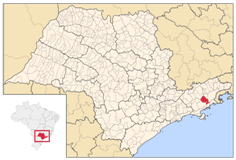
Introduction
São Luiz do Paraitinga (Figure 1) is a city located in the Valley of Paraíba in the São Paulo area. The municipality covers an area of 617 km² (Oliveira, 2011) and has a total population of just over 10 000. Historically, small holder agriculture was the main activity of the city, focused on the production of basic food. The city has a strong tradition (“bolsão caipira”) related to the land and the safeguarding of rural culture (Brandão, 1995), however, the quality of its soil has recently suffered due to changes in economic activities, namely, the incursion of eucalyptus production .
Eucalyptus arrived in the municipality as a result of government incentives during the military dictatorial period in the early 1970s. It first came to a farm where live 50 families worked producing many agricultural products, and raising pork and cattle (Toledo, 2012). Now the area has been reforested by pulp mill industries that have increased eucalyptus plantations for cellulose production, with three large producers in the region (Silveira, 2008; Cantinho et al, 2011; Toledo, 2012; Veiga, 2013).
Click here for the factsheet (3 pages):FS_034_Eucalyptus monoculture in São Luiz do Paraitinga

The project ENVJUSTICE has received funding from the European Research Council (ERC) under the European Union’s Horizon 2020 research and innovation programme (grant agreement No. 695446)